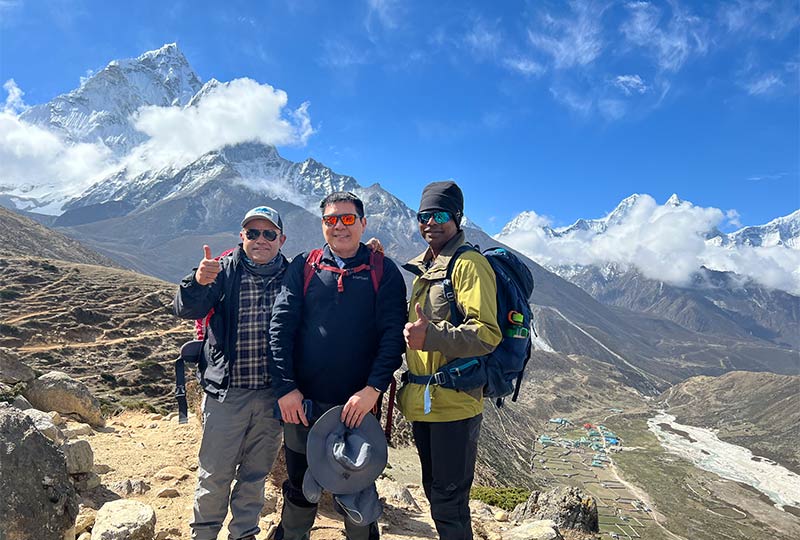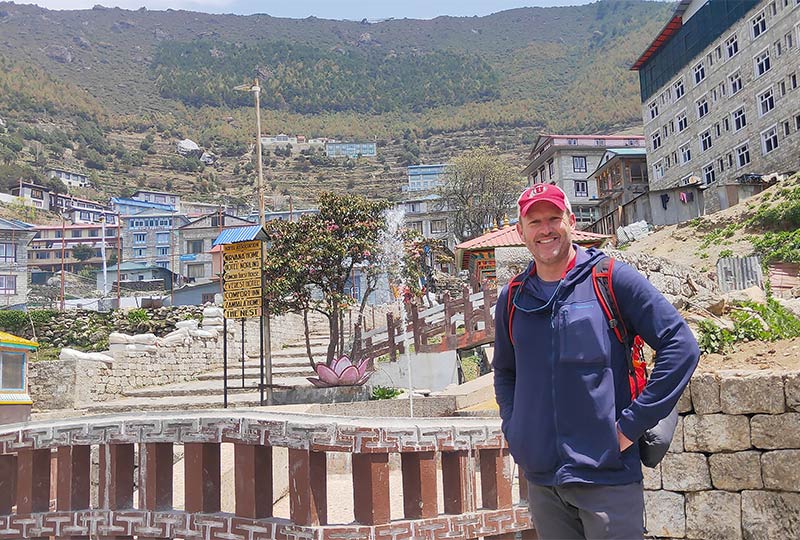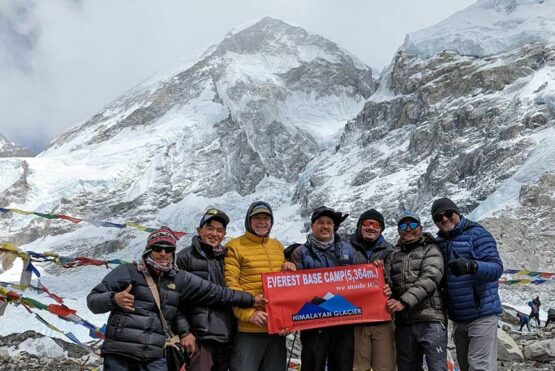Our Everest Base Camp trek guide is designed to tame your curiosity regarding the epic journey to EBC sitting on the lap of the world’s tallest peak Mount Everest. Everest has been attracting trekkers and mountaineers from all around the world for decades. While reaching the summit of Everest is an extremely challenging feat, you can experience the presence of the majestic peak through an adventurous trek to its base camp. Everest stands tall at an astounding height of 8,848 m (29,029 ft), whereas EBC sits at an altitude of 5,364 m (18,193 ft).

The trek to EBC is one of the most popular routes in the Himalayas. It offers a chance to experience the enchanting views of the world’s tallest mountain. At the same time, it allows you to experience the intriguing landscape and rich culture and lifestyle of the Sherpas. The journey that begins from Kathmandu takes you through diverse terrain in the Himalayas leaving you with memories that will last a lifetime.
Making many adventure-seekers’ dreams come true, Himalayan Glacier has conducted countless successful treks to the base camp. Whether you are an avid trekker or simply looking for an adventure, Himalayan Glacier promises you an unforgettable trekking experience at EBC. So, are you ready for backpacking to the base camp? This well-detailed guide to the Everest Base Camp trek will walk you through all you need to know about the EBC trek in 2023.
- Highlights of Everest Base Camp Trek
- Overview and Stats of EBC Trek
- Guide to Everest Base Camp Trekking Routes
- Guide to Everest Base Camp Trek Itinerary
- Details on EBC Entrance & Permit
- Insurance Details for EBC Trek
- Altitude Sickness and Preventive Measures
-
FAQs- Everest Base Camp Trek Guide
- Is the EBC trek Difficult?
- What is the best time to trek Everest Base Camp?
- Where to stay before and after the EBC trek?
- How much does it cost to go on the EBC trek?
- Is the trek to Everest Base Camp Dangerous?
- How cold is Everest Base Camp?
- How is the accommodation in the EBC trek?
- Is a solo trek to EBC possible?
- Can you climb Everest without a guide?
- How is the facility of internet, electricity, and mobile network during the EBC trek?
- To Conclude
Highlights of Everest Base Camp Trek
Trek to Everest Base Camp is one of the most popular routes for many reasons. One of them is the glorious nature that surrounds you throughout the journey, immersing you in its tranquility. These are some of the highlights of the trek that will make your trip worthwhile:
- Experience a thrilling flight from Kathmandu to Lukla with a picturesque view of diverse terrain.
- Visit the historic Tengboche monastery in the Khumbu region.
- Walk around the beautiful Namche Bazaar
- Witness up-close sight of the world’s tallest mountain.
- Relish the panoramic view of the Himalayas from Kala Patthar.
- Witness the culturally rich traditions and lifestyle of the Sherpa people.
Overview and Stats of EBC Trek
The adventurous endeavor that extends from Kathmandu to Everest Base Camp and Kala Patthar, will ascend you from 1,350 m (4,429 ft) to 5,545 m (18,193 ft) elevation. The wide shift in altitude gain will allow you to explore the diverse landscape of Nepal and the wide range of flora and fauna throughout the trek.

The base camp is 200-300 km (124-186 miles) far from Kathmandu. As the trek generally begins from Lukla, you will be walking a round trip of approximately 130 km (80 miles). Moreover, it is one of the popular routes for trekking in Nepal and welcomes approximately 40,000 trekkers yearly.
Guide to Everest Base Camp Trekking Routes
There are mainly three trekking routes to the southern base camp of Everest. Depending upon the route you take, the Everest Base Camp duration may vary from 2 weeks to 3 weeks. The classical routes that Himalayan Glacier has prepared for the short trip to EBC are of 14 days and 16 days. These trekking routes are beginner friendly as well.

But, if you are looking for extensive experience, you can choose the routes to EBC via Gokyo Lake and Chola Pass and the high passes in the Everest region. These routes will take you around 18 to 20 days on the exciting journey to EBC. Furthermore, check out the guide to Everest Base Camp trek routes, to thoroughly understand what each route has to offer.
Guide to Everest Base Camp Trek Itinerary
From the four different routes to EBC as mentioned above, the standard package that Himalayan Glacier offers is of 16-day duration. Follow through the briefly-explained guide to the Everest Base Camp trek itinerary for a better overview:
Kathmandu to Phakding
After you arrive in Kathmandu, your journey to EBC will begin with a flight to Lukla. From Lukla, your trekking journey begins. You will reach Phakding, lying at an altitude of 2,800 m (9,187 ft), after 3-4 hours of walking.
Phakding to Namche Bazaar
The following day you will enter the beautiful Namche Bazaar after a 5 to 6-hour trek from Phakding. The elevation gain will be 3,438 m (11,280 ft). The following day of the hike is followed by an acclimatization day to prepare your body for the rest of the trek.
Namche Bazaar to Dingboche
After the acclimatization day, you will trek to Tengboche for 5-6 hours. And the next day you will walk for another 5-6 hours to Dingboche. It will take you to an altitude of 4,360 m (14,305 ft).
Dingboche to Lobuche
After another acclimatization in Dingboche, you will head towards Duglha. From Duglha, you will walk for 2-4 hours to Lobuche, taking you to the elevation of 4,940 m (16,208 ft).
Lobuche to EBC and Kala Patthar
From Lobuche, your journey will lead you to Everest Base Camp and Kala Patthar via Gorak Shep. Then you will head back to Namche Bazaar via Pheriche, and return to Kathmandu via Lukla flight.
Details on EBC Entrance & Permit
You will require 2 permits to enter Everest Base Camp. One permit is Khumbu Rural Municipality Permit and the other is Sagarmatha National Park Entry Point. The cost for each permit varies depending on your nationality.
For the Khumbu permit, SAARC nationals, and citizens from India, Bangladesh, Bhutan, Maldives, Sri Lanka, and Pakistan), must pay NPR 1,000 ($7) per person. And, for foreigners from non-SAARC countries, the Khumbu Permit will cost NPR 2,000 ($15).

Likewise, the Sagarmatha National Park entry permit costs NPR 1,500 ($11) for SAARC nationals and NPR 3000 ($22) for other nationals. And, the entry fee for Nepalese people is NPR 100 ($0.76) with an additional 13% VAT. You can obtain a Khumbu permit from the issuing office on your trekking trail at Lukla. On the other hand, you can obtain a Sagarmatha National Park permit through the government website, or at the national park entry point at Monjo.
Insurance Details for EBC Trek
This is a crucial aspect of your trek to EBC. You never know what mishap you might face along your trip in the Himalayas. Therefore, a reliable insurance plan will help you through emergencies. Travel insurance mainly covers the difficulties due to altitude sickness, accidents, and flight cancellations.
One of the major services travel insurance provides is immediate helicopter rescue during health emergencies or weather hazards. Travel insurance for higher elevations covers up to the altitude of 6,000 m (19,685 ft). You can easily purchase insurance from your local area. Please note that we do not sell or make arrangements for your insurance policies.
Altitude Sickness and Preventive Measures
EBC trek is among the physically demanding treks in Nepal. As the trekkers are constantly subjected to rapid altitude gain and thinning atmosphere, there is a high chance of altitude sickness. Trekking in higher altitude destinations is all about your physical and mental fitness. Therefore, the effect of altitude sickness is not to be taken lightly. So much so, it can cause severe health issues if one fails to take proper preventive measures for altitude sickness.
Some of the symptoms of altitude sickness are nausea, vomiting, headache, dizziness, fatigue, and loss of appetite. However, adopting some preventive measures can lower the risk of altitude illness. On that note, you should drink at least 3 to 4 liters of water on a daily basis throughout the trek. Likewise, you should avoid alcoholic drinks and smoking and carry preventive medicines. Most importantly, do not trek longer distances at once, and make sure to get sufficient rest to prevent altitude sickness in the Himalayas.
FAQs- Everest Base Camp Trek Guide
Is the EBC trek Difficult?
Based on the terrain and the duration of the Everest Base Camp trek, it falls under a moderately demanding grade in terms of difficulty. If you are a beginner, you can go with the 2-week package of the EBC trek. If you are an avid trekker, the 18-20 days long EBC trek would be preferable.
What is the best time to trek Everest Base Camp?
Fall or autumn (September to November) and spring (March to May) are the best times to go backpacking to EBC. On the other hand, the harsh weather conditions during winter, summer, and monsoon can bring several difficulties during the trek.
Where to stay before and after the EBC trek?
As the EBC trek is a famous trekking route, there are plenty of accommodation options for travelers based on their budget. You can find high-end to average hotels along the way. There are no five-star accommodations available at the higher elevation, but you will find a decent place to stay overnight. Generally, your accommodation is taken care of by your travel agency.
How much does it cost to go on the EBC trek?
The cost of the EBC trek depends upon your itinerary duration, quality service and expert guide etc. However, the cost of a standard 14 to16-day package may range anywhere from $1800 to $4500.
Is the trek to Everest Base Camp Dangerous?
It depends on several factors. Trekking during extreme winter and monsoon can be more dangerous compared with other trekking seasons. But generally, the trekking route to EBC is moderately difficult and beginner-friendly.
How cold is Everest Base Camp?
The temperature at Everest Base Camp varies year-long with changes in seasons. On average, during the day the peak summer temperature is as high as 22°C (71°F), while it drops to -5°C (23°F) during the winter. Likewise, night temperatures range from the highest of 4°C (39°F) to the lowest of -15°C (5°F).
How is the accommodation in the EBC trek?
You cannot expect five-star accommodation at a higher elevation trek. But, you will find plenty of options for a decent hotel or teahouse with clean and cozy rooms, internet, electricity, and hot water showers.
Is a solo trek to EBC possible?
Of course, it is possible. But, if you are not familiar with the terrain and natives, the trek may not be successful without the assistance of an experienced guide.
Can you climb Everest without a guide?
Climbing Everest is not an easy feat. It requires extreme dedication and training for a person even to dare to take on this challenging adventure. Whether you are an avid mountain climber or climbing Everest for the first time, the assistance of a guide is a must for your safety. And the same goes for the EBC trek as well. Navigating through the routes of the Everest Base Camp trek without a guide might present you with difficulties along the way. So, it is highly recommended to take the assistance of a well-experienced guide while embarking on an adventure in the Himalayas.
How is the facility of internet, electricity, and mobile network during the EBC trek?
You need not worry about the facility of internet and electricity along the trekking trail of EBC. However, you will have to pay additional charges for charging your devices and using the Wi-Fi service at teahouses. As mobile networks work well along the trail, you can use various data packages for the internet as well.
To Conclude
EBC trek will ensure the adventure of a lifetime. And, this Everest Base Camp trek guide might have answered all your questions regarding the trek. However, if you still have some confusion or wish to make a trip plan, feel free to contact our team of experts.
Himalayan Glacier Adventures, LLC ® is the #1 guiding adventure travel company on Mount Everest Base Camp and beyond with 98% success rate. Our reputation comes from our decades of quality service and our happy clients. Our priority for excellent service, reliability, and safety of the clients makes us stand out from other travel service providers. So, don’t miss out on the opportunity to experience a thrilling adventure with us, and follow us on Facebook for travel updates.






